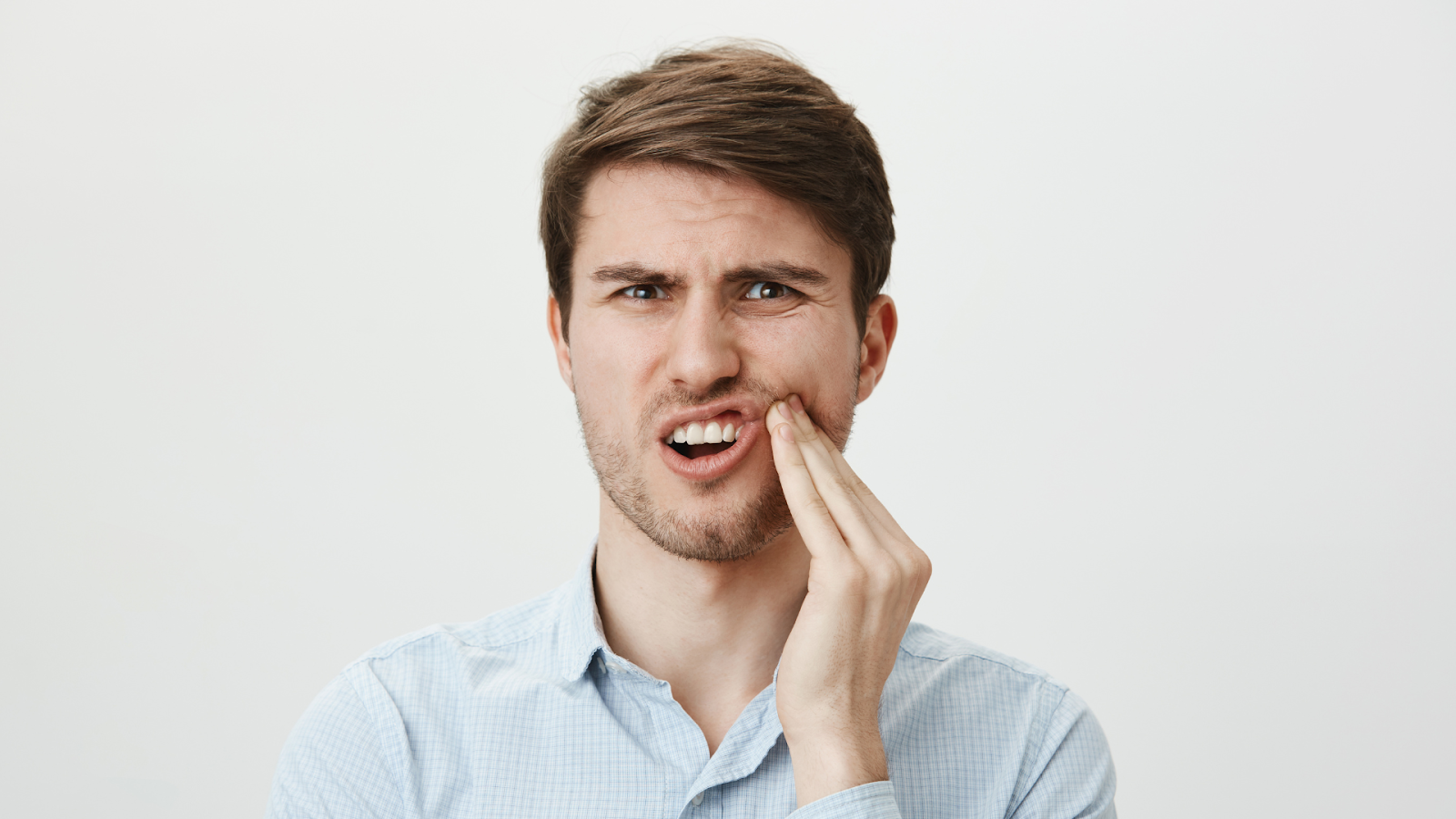
Can TMJ Dysfuntion Cause Ear Pain?
Many people wake up feeling ear pressure, dizziness, or discomfort without a clear reason. While these signs are usually linked to sinus infections or ear problems, there's another possible cause: TMJ disorder. The temporomandibular joint (TMJ) connects your lower jaw to your skull and helps in everyday movements like chewing and speaking.
If the TMJ is inflamed or not working properly, it can also lead to TMJ and ear pain. In many cases, this dysfunction may also cause ear fullness and dizziness, especially in the morning.
What is TMJ Disorder?
TMJ disorder, or temporomandibular joint disorder, affects the jaw joint and surrounding muscles. It occurs when the jaw joint is overused, inflamed, or injured. Located near the ear, the TMJ helps with talking, chewing, and swallowing. When it becomes inflamed or irritated, it can cause jaw pain and radiating symptoms to nearby areas, including the ear canal.
Common causes include teeth grinding, jaw clenching, trauma, and arthritis. TMJ-related pain often overlaps with ear problems, making diagnosis harder. People may not notice the connection until they experience persistent ear pain, jaw discomfort, or dizziness. Treatment helps reduce pain and restore normal jaw function.

Common causes of TMJ disorder include:
- Jaw clenching and teeth grinding (often during sleep)
- Excessive gum chewing
- Trauma or injury to the jaw
- Misaligned teeth or bite issues
- Rheumatoid arthritis
These conditions can irritate the jaw muscles and surrounding structures, triggering symptoms that often overlap with ear-related issues.

The Connection Between TMJ and Ear Symptoms
Many TMJ disorder symptoms mimic those of ear infections or other ear problems. This is because the temporomandibular joint lies just in front of the ear canal, and the muscles that control jaw movement are connected to areas near the middle ear.
When there’s inflammation or stress in the TMJ, it can lead to TMJ ear pain, affecting the nerves and tissues close to the ear. These structures are tightly packed in a small space, so even a minor problem in the jaw can create pressure in the surrounding area.
Muscles around the jaw often become tense from teeth grinding or jaw clenching. This tightness can pull on tissues connected to the ear and cause common symptoms like pain, fullness, or ringing. In some people, the pressure even affects balance and hearing.
The middle ear shares a nerve pathway with the jaw, so TMJ issues can create ear symptoms even in the absence of infection or fluid buildup. Recognising this link helps avoid confusion during diagnosis and prevents mistreatment.
How TMJ affects the ear:
- Inflammation in the jaw joint may place pressure on the ear canal
- Nerve irritation, especially the trigeminal nerve, can radiate pain toward the ear
- Muscle tension around the jaw can compress nearby structures
Common TMJ-related ear symptoms:
- TMJ ear pain (localised and dull)
- Ringing sound (tinnitus)
- Ear pressure or fullness
- Sensation of a blocked ear
- Mild hearing loss

TMJ vs Ear Infection Symptoms:
| Symptom | TMJ Disorder | Middle Ear Infection |
|---|---|---|
| Ear pain | Dull, aching | Sharp, throbbing |
| Jaw pain | Yes | Rare |
| Popping sounds when chewing | Common | Rare |
| Fever | Rare | Common |
| Dizziness | Sometimes | Sometimes |
| Ringing in ears | Common | Less common |
| Affected by jaw movement | Yes | No |
Why You Might Wake Up with Ear Pain and Dizziness
Waking up with ear pain and dizziness may be more than just a minor annoyance. It often signals issues related to the temporomandibular joint (TMJ), particularly if you frequently clench your jaw or grind your teeth while asleep.
During sleep, people are less aware of jaw movement, which can create tension in the jaw muscles and surrounding structures. Because the TMJ is located close to the ear canal and inner ear, stress and inflammation in this joint can cause a range of ear symptoms.
Muscle fatigue, nerve irritation, and changes in pressure can affect the ear's function, causing symptoms that feel like a blocked ear or imbalance. These symptoms are particularly common in the morning after hours of unconscious jaw activity.
Possible reasons include:
- Teeth Grinding (Bruxism): Continuous pressure on the jaw muscles and joints throughout the night.
- Jaw Clenching: Muscle tension builds up and may compress nearby nerves, leading to dizziness or fullness.
- Poor Sleep Posture: Sleeping in an awkward position that puts a lot of pressure on the jaw can misalign the jaw joint.
- Jaw Muscle Inflammation: Can cause stiffness, pain, and pressure sensations in the ears.
- Fluid Shifts During Sleep: Lying down may alter fluid balance in the inner ear, worsening symptoms tied to TMJ inflammation.
Understanding these causes helps target the right treatment to reduce discomfort and improve sleep quality.
Other TMJ-Related Symptoms to Watch For
TMJ disorder often causes symptoms that extend beyond the jaw. These signs are frequently overlooked or mistaken for sinus infections, headaches, or neurological conditions. The range of discomfort can vary from mild pain to more serious issues that interfere with chewing, speaking, and hearing.
The problem may not be limited to the joint alone; it can impact surrounding muscles and nerves too.
Other TMJ symptoms include:
- Facial tenderness, especially near the jawline
- Clicking, popping, or grinding sounds while opening or closing the mouth
- Headaches starting from the temples
- Discomfort while biting or chewing
- Pain in the neck or shoulders
- Jaw stiffness or limited ability to open the mouth
- Persistent dull pain near the ears
- Pain spreading from the jaw to the cheekbone
- Uneven bite or shifting teeth
- Sensitivity in jaw muscles upon waking
These symptoms may develop gradually and often worsen with stress or poor posture. Individuals may also notice a correlation between symptoms and habits like nail biting, chewing on pens, or leaning their chin on their hands.
Behavioural and Physical Triggers for TMJ Symptoms
| Trigger | Effect on TMJ |
|---|---|
| Teeth grinding during sleep | Increases joint and muscle stress |
| Poor head posture | Strains the jaw and neck alignment |
| Excessive gum chewing | Overuses the jaw muscles |
| Stress and anxiety | Leads to jaw clenching |
| Sudden jaw movement | May cause joint misalignment |
Diagnosing TMJ-Related Ear Fullness and Dizziness
Diagnosing TMJ disorder can be complex because its symptoms often overlap with ear infections, sinus problems, or neurological issues. Many patients who report persistent ear pain or dizziness are initially treated for unrelated conditions before TMJ disorder is considered. This delay in diagnosis can lead to prolonged discomfort and ineffective treatments. That’s why a thorough clinical assessment is necessary.
A skilled healthcare provider will start by listening to the patient’s symptom history. Jaw clicking, limited jaw movement, and pain that increases while chewing or talking are strong indicators of TMJ issues.
The doctor will then examine the jaw’s range of motion, check for tenderness in surrounding muscles, and listen for popping or grinding sounds when the jaw moves.
Diagnostic procedures may include:
- Medical history review: Identifying patterns of jaw pain, jaw clenching, or teeth grinding.
- Jaw function tests: Observing the movement and alignment of the jaw.
- Palpation of jaw and neck muscles: Detecting inflammation, tightness, or sensitivity.
- Dental imaging: X-rays, MRI, or CT scans to detect joint damage or inflammation.
- Bite analysis: Evaluating dental alignment that might stress the jaw joint.
- Referral to specialists: In uncertain cases, an ENT doctor or TMJ specialist may assist in ruling out ear-specific disorders.
Early and accurate diagnosis of TMJ disorder helps ensure the right treatment path is followed and prevents confusion with unrelated conditions like middle ear infections.
Effective Treatments for TMJ-Related Ear and Dizziness Symptoms
Treating TMJ disorder, especially when it leads to ear fullness and dizziness, involves more than just temporary fixes. Long-lasting relief usually comes from a structured approach tailored to the underlying cause. TMJ issues can vary from mild to severe and might include inflammation, joint damage, or chronic habits like teeth grinding. Identifying what triggers your symptoms is the first step toward managing the condition effectively.
A TMJ treatment plan often includes both medical and lifestyle strategies. For immediate pain relief, over-the-counter anti-inflammatory drugs like ibuprofen can help reduce swelling and discomfort. Muscle relaxants may be prescribed in more persistent cases to ease tightness in the jaw muscles. A custom-made night guard, worn while sleeping, helps prevent teeth grinding and jaw clenching. This simple device protects the jaw joint and promotes better alignment.
Physical therapy is another important treatment. Exercises that target jaw mobility and strength improve overall function and relieve tightness. Therapists also guide patients on posture correction, which plays a role in jaw strain. Some patients benefit from Botox injections to relax overactive jaw muscles, especially if clenching or grinding continues despite other interventions.
Lifestyle changes are essential. Avoiding excessive gum chewing, chewing on pens, or biting nails reduces pressure on the TMJ. Managing stress through relaxation techniques, including deep breathing exercises, meditation, or gentle yoga, may lower the chances of clenching your jaw during the day or night.
Additional Treatment Tools:
- TMJ Dentists or Oral Surgeons: Evaluate bite problems and misalignment.
- Counselling or Stress Management Programs: Address emotional factors contributing to TMJ symptoms.
- Diet Modifications: Eating soft foods during flare-ups reduces strain on the joint.
- Hot or Cold Compresses: Help relieve localised pain and inflammation.
- Ultrasound Therapy: Sometimes used to improve blood flow to the jaw area.
Consistent use of these treatments leads to reduced jaw stiffness, fewer dizzy spells, and less ear fullness over time. Personalised care, often guided by a TMJ specialist, provides the most sustainable improvement. If dizziness or persistent ear pain continues, it’s important to consult with a multidisciplinary care team including dentists, physical therapists, and ENT doctors.
Tips to Prevent TMJ Flare-Ups During Sleep
Preventing nighttime TMJ symptoms like ear pain, jaw pain, or dizziness involves small but effective lifestyle changes. Nighttime is when many people unknowingly grind their teeth or clench their jaws, both of which can aggravate the temporomandibular joint. These small actions during sleep can result in stiffness, discomfort, or ear-related symptoms in the morning. Adopting proper nighttime habits can protect the jaw joint and improve sleep quality.
Things you can do:
- Use a Custom Night Guard to prevent teeth clenching and grinding. This reduces pressure on the jaw and protects the teeth.
- Practice Relaxation Techniques like deep breathing exercises, progressive muscle relaxation, or meditation before bed to reduce muscle tension.
- Adjust Sleeping Position to avoid putting weight or pressure on the jaw. Try sleeping on your back with a supportive pillow.
- Avoid Chewing Gum before sleep, as it activates the jaw muscles and increases tension.
- Maintain Good Posture throughout the day to prevent misalignment and strain on the jaw.
- Reduce Stress Levels through exercise, journaling, or breathing routines to minimise subconscious jaw clenching.
- Apply Warm Compresses on the jaw before sleeping to relax the muscles and improve blood flow.
- Limit Screen Time Before Bed to support natural relaxation and reduce tension built up during the day.
- Stay Hydrated and avoid caffeine close to bedtime, as dehydration and stimulants may increase nighttime muscle tension.
When It Might Not Be TMJ: Other Causes of Ear Fullness and Dizziness
While TMJ is a common cause of ear-related issues, not all symptoms are linked to the jaw. It is important to consider alternative causes, especially when TMJ treatment fails to improve the condition. Ear fullness and dizziness are symptoms that may stem from a variety of medical problems affecting the ears, sinuses, nerves, or even the neck. A proper diagnosis requires a clear understanding of these overlapping conditions and the potential for persistent pain.
- Middle Ear Infection: Often causes sharp, sudden pain, fever, and sometimes fluid drainage. These infections can affect hearing and balance.
- Sinus Infections: Mucus buildup can increase sinus pressure, which affects the ears and may cause light-headedness or dizziness.
- Eustachian Tube Dysfunction: These small tubes help equalise ear pressure. If blocked due to allergies or infection, they can lead to a sensation of fullness or popping in the ears.
- Vertigo or Inner Ear Disorders: Conditions like Ménière’s disease or vestibular neuritis impact the balance centre of the inner ear, causing spinning sensations and nausea.
- Neck Problems: Poor neck posture or cervical spine disorders may result in symptoms that resemble TMJ-related dizziness.
- Sleep Disorders: Obstructive sleep apnea or other nighttime breathing issues can affect oxygen levels and inner ear pressure, contributing to dizziness and fatigue.
If symptoms persist despite TMJ-specific care, further evaluation by an ENT, neurologist, or sleep specialist may be necessary.
Conclusion
If we wake up with a sense of ear fullness, dizziness, or pain in the jaw, it might be more than just a passing discomfort. These signs could indicate a TMJ disorder. This condition doesn’t only affect the jaw joint, it can extend to nearby muscles, nerves, and even our hearing. Because the temporomandibular joint is located close to the ear canal and inner ear, problems in the joint can lead to symptoms that feel like ear infections or sinus pressure.
If we are experiencing ear pain, jaw stiffness, or discomfort that worsens with chewing or speaking, we should consider whether TMJ might be the cause. Ignoring these symptoms may delay proper care. It’s important to rule out other conditions, but also not overlook the jaw joint as a potential source.
We should consult our orthodontist for a proper assessment and diagnosis. Early evaluation can help manage symptoms effectively and prevent long-term joint damage.
FAQs
1. Can TMJ cause waking up with ear fullness?
Yes, TMJ disorder can cause you to wake up with a feeling of ear fullness. This happens when jaw clenching or teeth grinding at night causes tension in the jaw muscles. The jaw joint is located near the ear canal, and muscle strain can put pressure on surrounding structures.
This often leads to a sensation of blocked or full ears in the morning, highlighting the need for various treatment options. Unlike ear infection symptoms, this type of fullness is not caused by fluid or bacteria.
2. Can TMJ cause waking up with ear fullness and dizziness?
Waking up with both ear fullness and dizziness can be linked to TMJ disorder. TMJ symptoms may result from excessive jaw movement or stress during sleep. Tight jaw muscles may affect nerves connected to balance and hearing.
The inner ear is close to the temporomandibular joint, and pressure in that area can trigger dizzy spells. Identifying TMJ as the cause helps avoid confusion with vertigo or middle ear infections.
3. Does TMJ cause ear pain throughout the day?
TMJ-related ear pain can last all day if the joint remains irritated or overused. Continuous teeth clenching or stress may worsen the pain. This kind of ear pain often feels dull and persistent. It may increase when chewing or moving the jaw.
Since TMJ pain comes from the jaw muscles and joint, treatment involves addressing muscle tension and improving jaw alignment.
4. How do I know if ear pain is from TMJ or an ear infection?
TMJ-related ear pain is usually dull and worsens with jaw movement. It often comes with other symptoms like jaw pain, neck pain, or headaches. Ear infections usually cause sharp pain, fever, and fluid drainage.
Also, TMJ symptoms may include clicking or popping sounds in the jaw. A medical exam, including a physical examination and imaging, can help tell the difference.
5. What are the best ways to relieve TMJ-related dizziness and ear pain?
You can manage TMJ-related symptoms with simple treatments. Start by using a night guard to prevent teeth grinding. Physical therapy and jaw exercises also improve jaw function and muscle balance. Over-the-counter muscle relaxants and pain relief medication can help reduce pain.
Avoid chewing gum, use warm compresses, and try deep breathing exercises to lower muscle tension. If symptoms persist, consult a TMJ specialist.
Leave a comments